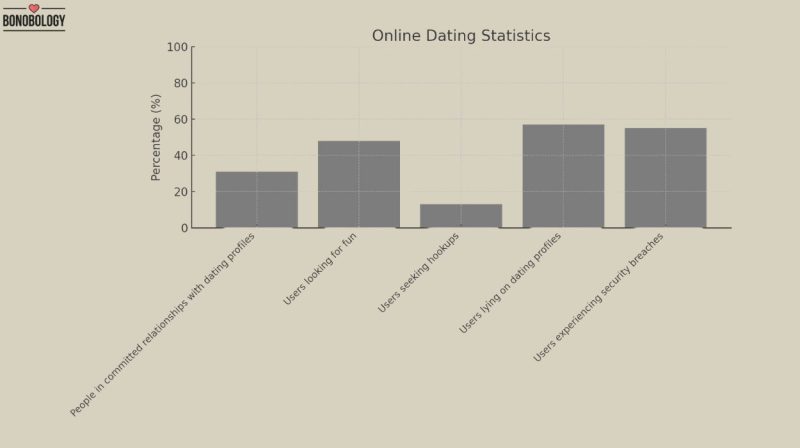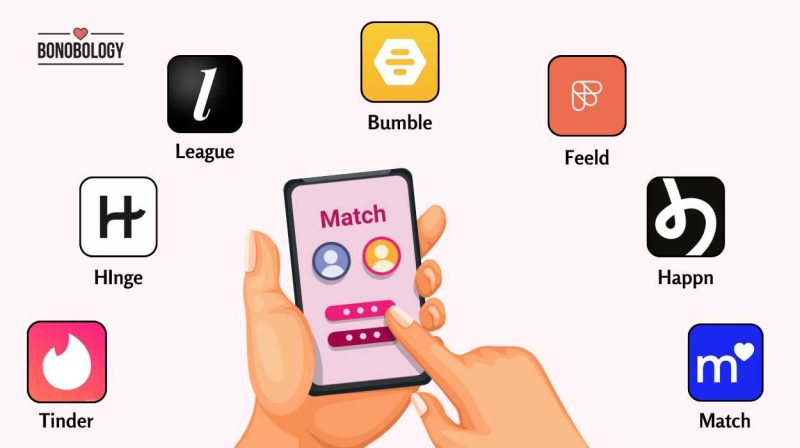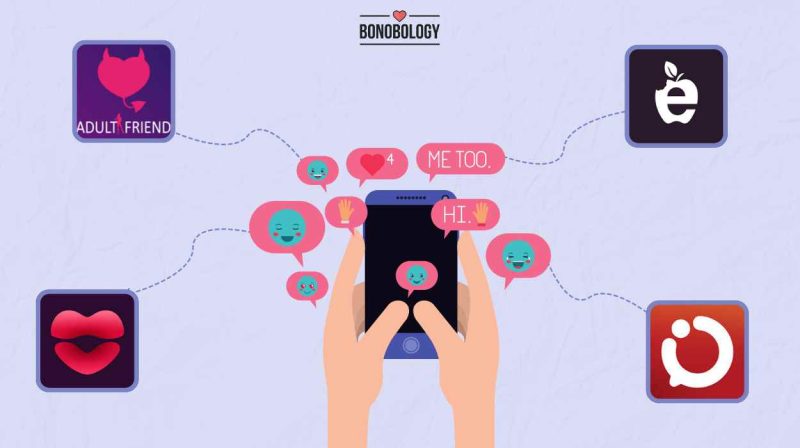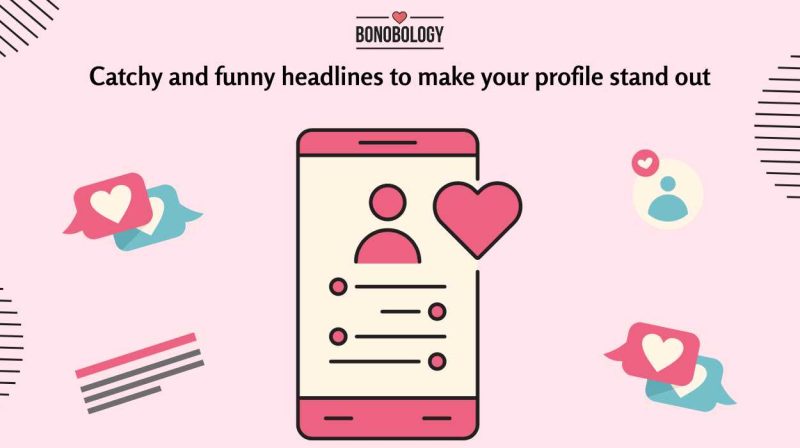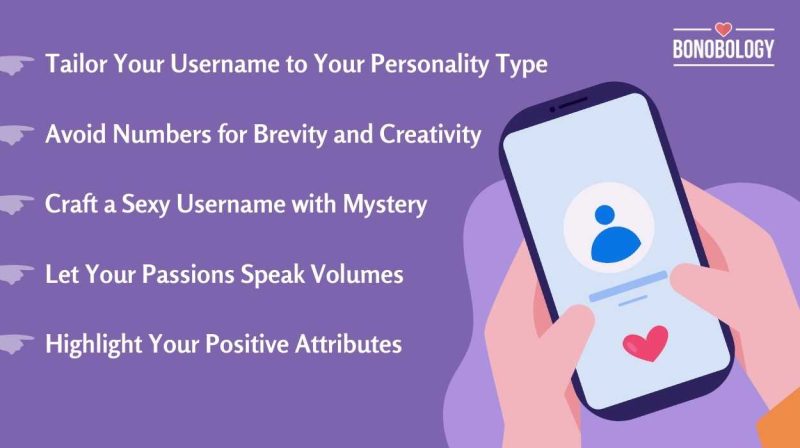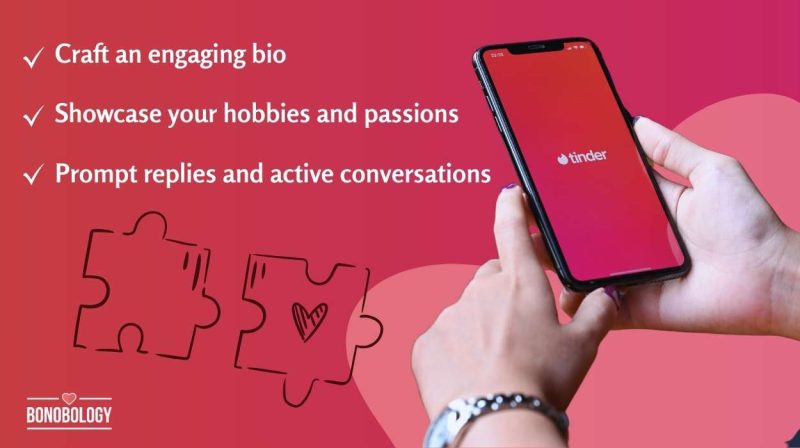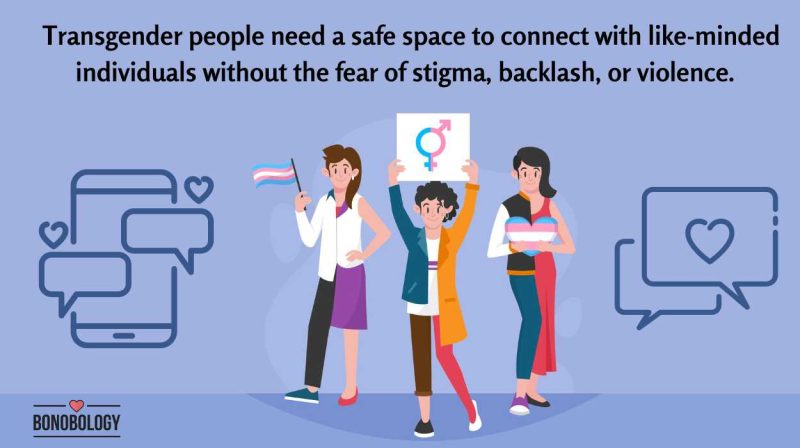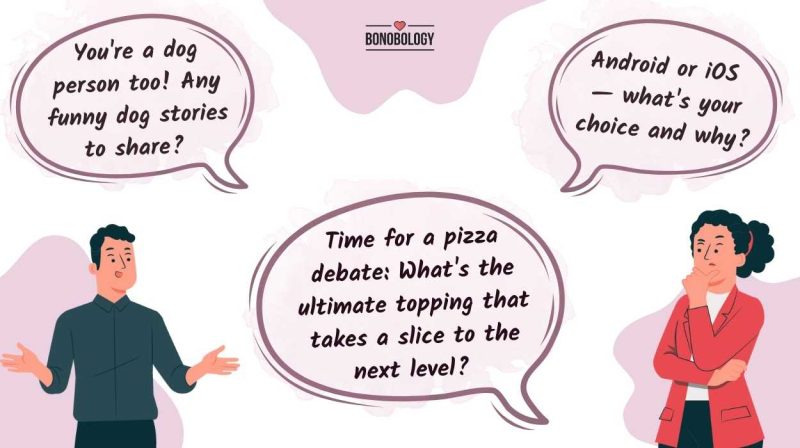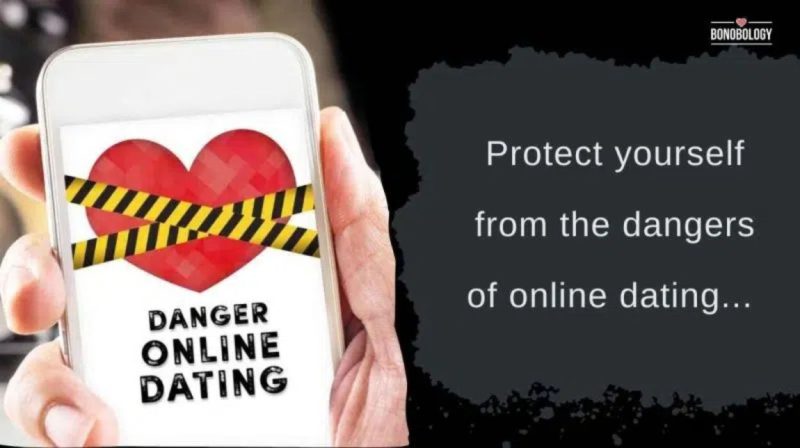Digital technology has transformed virtually every aspect of our lives, including the way we connect with others and form romantic alliances. Over the years, internet dating has become the norm for finding romantic partners. A Pew Research Centre study shows that the number of US adults who have been active on the online dating scene has tripled in the 18 to 24 years age group and doubled among users in the 55 to 64 years age bracket since 2013.
At the same time, users who viewed online dating as a good way to meet new people have grown from 44% in 2005 to 59% almost a decade later. These numbers have grown even more dramatically during the Coronavirus pandemic. While 30% of adults in the US were active on online dating apps and sites before COVID-19 hit, the virus triggering a pandemic and the lockdown provisions that followed in its wake have led to a sudden spike in activity as well as new sign-ups across dating platforms.
It’s clear that the way we forge relationships has changed, and the strings of the heart are now controlled by technology, devices, and the internet. As online dating becomes more popular, safety concerns—both emotional and physical—are also growing stronger. The vulnerability of online dating platforms first came under the spotlight with the Ashley Madison breach in July 2015, when a group named ‘The Impact Team’ stole the data of over 32 million users registered on the site enabling extramarital affairs.
More than five years later, the breach continues to haunt the users, even as hackers have resurfaced with a fresh model of sextortion—this time reaching out directly to the users, threatening to expose their personal information if they failed to pay $1,000 in bitcoin.
This isn’t a standalone incident. The U.S. saw an all-time high of 3.5 million individuals affected by data compromises in 2023. Many of these breaches involved dating apps. High-profile legal cases, like Grindr’s alleged sharing of sensitive user data without consent, are just one example of the many dangers of online dating users have to contend with. Awareness of these potential risks and pitfalls is crucial for safeguarding oneself, even more so given that the process entails sharing personal information and connecting with virtual strangers.
Only when you are aware of the pitfalls will you commit to maintaining cyber hygiene and take necessary precautions to protect your devices and yourself from malicious people lurking in the virtual space. To help, we have come up with a detailed rundown on the risks of online dating and internet safety habits.
Jaw-Dropping Statistics About Dangers Of Online Dating
Table of Contents
Online dating offers the perfect platform to meet like-minded people, thanks to intelligent algorithms throwing up a carefully curated selection of matches. That is perhaps why the number of people seeking and finding long-term meaningful relationships on these platforms is also steadily on the rise.
While in theory, it all sounds as close to perfect as possible, there is a less-than-pleasant side to online dating as well. That’s why before delving into the risks and recommended safety practices, we’d like to offer some online dating statistics to put things in perspective. As per a recent study:
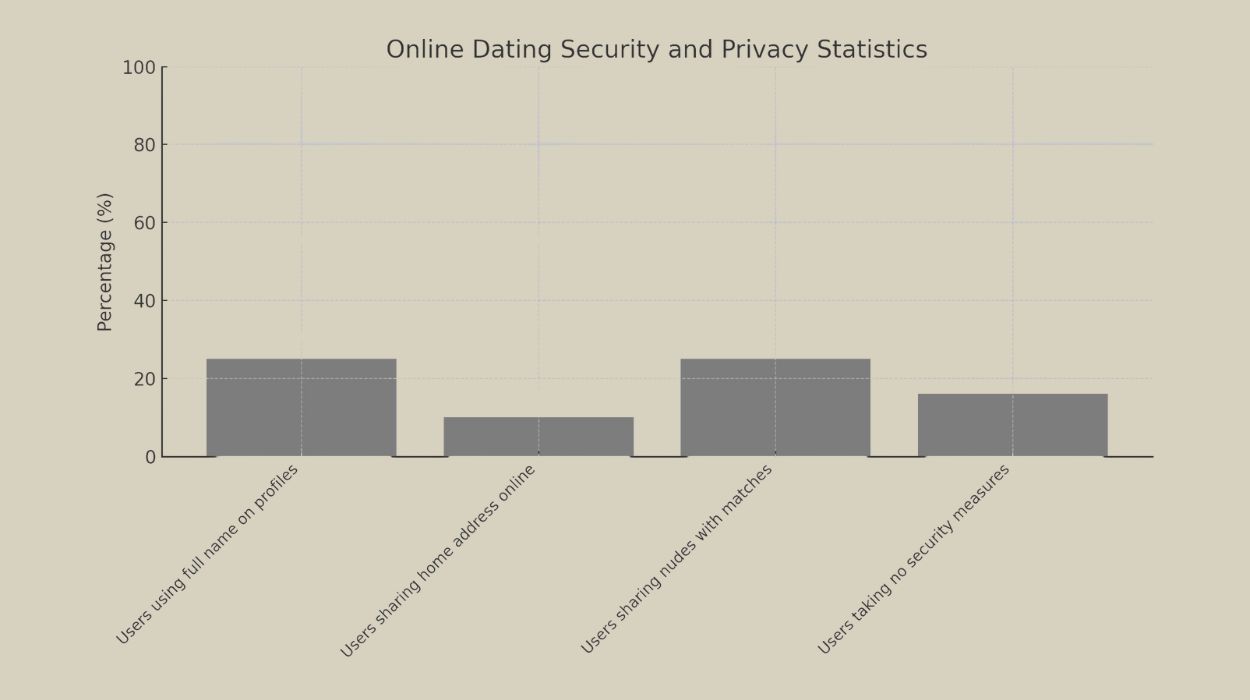
- 32% of internet users are active on the online dating scene. The average persona looks something like this: A full-time working professional, 33.8 years old, more likely to be male, tech-savvy, employed in a mid-level managerial position or subject matter experts in their chosen field
- 43% of online dating users are in the 25-34 years age bracket. Of these, 39% are men, 25% women
- 31% of people who are in long-term committed relationships or married also have online dating profiles
- Most users access these apps and sites from multiple devices, ranging from PCs to tablets and smartphones
- 51% use their work-related devices to peruse online dating platforms, potentially putting confidential data at risk
- A majority of users—48%—sign up on these platforms looking for fun, 13% are looking solely for sexual liaisons and only a small fraction want meaningful relationships
- 25% of users use their full name on their dating profiles
- One in ten have given out personal details such as their home address to a person they’ve connected with online
- 25% of users have shared nudes with their matches
- 57% of users lie to some extent on their dating profiles. The fudged details can range from their names to appearances, photos, location, and relationship status
- 63% of online daters are concerned about their devices being exposed to viruses and malware via dating platforms
- 61% share similar concerns about the safety of their data
- These concerns are not far-fetched since 55% of users have experienced some form of security-related problems and threats firsthand
- Yet, only 27% of users invest in a security solution such as an anti-virus to protect their devices and data
- In contrast, 16% of users take no security measures while using online dating platforms
These trends can be concerning when juxtaposed with the findings of a report that indicates:
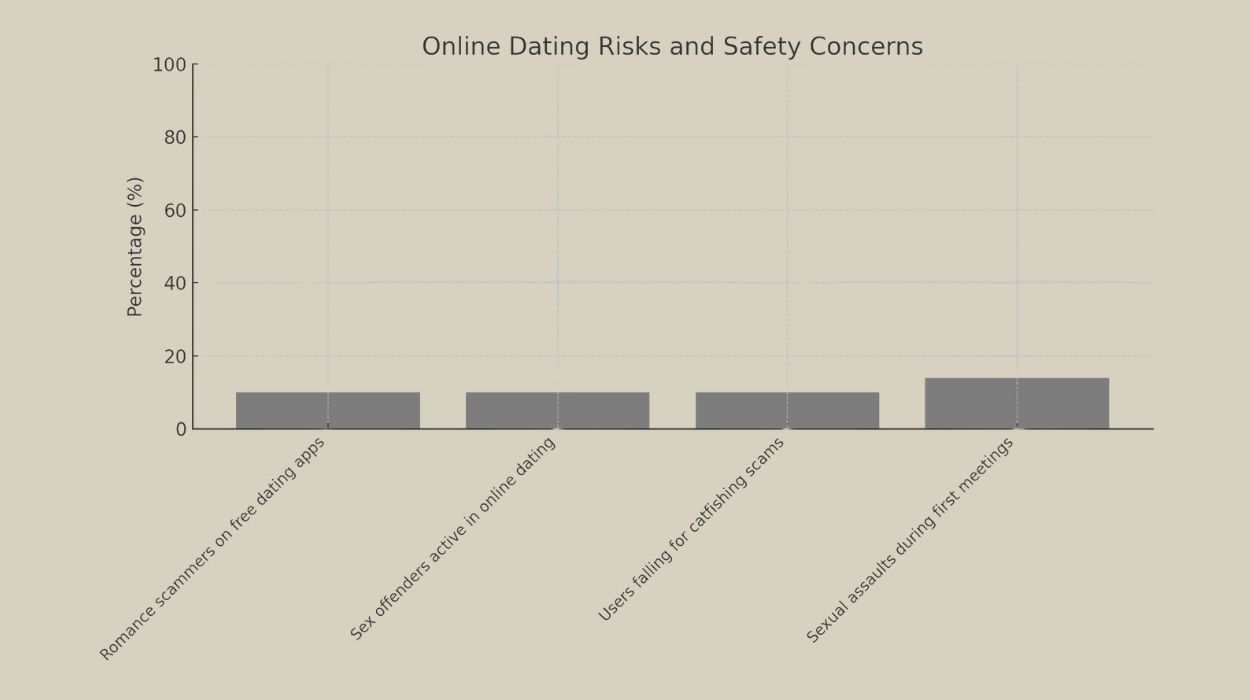
- 1 in 10 users on free dating apps are romance scammers
- 10% of sex offenders are active in the online dating scene
- Sexual assaults that can be linked to online dating apps and sites have increased six-fold in five years
Another report on online dating dangers and risks of romance scams and catfishing found:
- 46% of U.S. adults believe dating apps are unsafe platforms for meeting people. Women (53%) are more likely to perceive them as dangerous compared to men (39%)
- Approximately 31% of women reported being victims of cyberstalking while using online dating platforms
- 10% of online dating users admitted to falling for catfishing scams, with 8% of men even sending money to fraudsters
- Romance scams cost U.S. victims over $735 million in 2022, with a median loss of $2,000 per victim
- Cases of sexual assault linked to online dating have increased sixfold in the past five years, with some incidents involving serious violence
- A study revealed that 14% of sexual assaults occurred during first in-person meetings arranged via dating apps
Related Reading: 9 Best Background Check Sites For Dating Success
Risks of Online Dating
Data and identity theft or a potential hacker gaining access to your device and then holding you to ransom is just one of the risks associated with online dating. Beyond that, people with ill intentions can harm you in so many ways and on so many levels—physical, emotional, and sexual.
Curiously, no one—adults or teens, pros or newbies, heterosexuals or members of the LGBTQ community, young adults or seniors—is immune to these risks. Let’s take a closer look at some of the strongest dangers of online dating for different categories of users:
For Teens
Today’s teens are from the generation of digital natives. It’s only natural then that they turn to social media, private messaging and teenage dating portals in search of romantic connections. But is online dating safe for them? Even though these young people are extremely tech-savvy, they may not necessarily be tech-safe. This puts them at an increased risk of the following issues that can stem from making and maintaining romantic connections online:
1. Risk of sexual predators
A teen may connect with someone online assuming them to be of their age but people behind some of these profiles may not be who they claim to be. Fake profiles can be created by sexual predators or someone working for them to trick a young person into falling for them. This is one of the biggest online dating dangers for teens.
2. Unsavory outcomes of sexting

Teens can have a more casual approach toward sexting. Even if they’re engaging in it with a genuine romantic interest, if the contents of such chats—images and videos in particular—end up in the wrong hands, the consequences can be detrimental, ranging from bullying to extorting, harassment, emotional abuse, and even revenge porn.
3. Harassment
Venturing into the realm of online dating can expose teens to harassment, mental, emotional, or physical. Dealing with unwelcome advances from a potential match or online stalking can put them at risk of emotional or mental harassment. Similarly, being at the receiving end of sexually explicit messages or media and feeling pressured to reciprocate qualifies as sexual harassment.
4. Concerns about privacy
Linking social media handles to dating apps or sharing private information such as a home address, location, and details of school or college can expose a teen to miscreants lurking in cyberspace. This can compromise their safety greatly.
Related Reading: 10 Basic Netiquette Rules Everyone Should Follow
5. Need for validation
Concerns about teens pinning their self-esteem on social media activity are already mounting. Actively searching for a romantic connection in the virtual world can augment the risk of low self-esteem manifold. For instance, a young person may end up indulging in inappropriate behavior to win over someone they want to date. These actions can have life-long repercussions because nothing ever gets permanently deleted from the internet.
6. Reduced social interactions
As it is, the increasing screen time and gadget use have interfered with healthy social interactions between children and their peers, parents, family, and friends. When they end up pursuing love interests and maintaining relationships online as well, these interactions are only further diminished.

For Adults
Heterosexual adults make up a sizable majority of online dating users. Even though these are educated, financially independent people, their accomplishments in the personal and professional realms don’t necessarily make them immune to the risks of online dating.
Often, these risks are discussed vis-à-vis women. While it’s true that women are more likely to be harassed, stalked, or made to feel uncomfortable, men too aren’t completely safe either. Data suggests that they’re more likely to fall prey to phishing, malware, or being duped via online dating. Some of the most common dangers of online dating for adults are:
1. Being cheated emotionally
It’s not unusual for people who are married or in a long-term relationship to sign up on online dating platforms or even create fake social media looking in their quest for some fun and action on the side. More often than not, these people lie about their relationship status. Getting involved with someone who is already committed can be emotionally scarring, particularly for a person who is looking for a meaningful connection. Of course, when the truth comes to light, their partner feels cheated. Besides, their constant emotional unavailability or distance can take its toll.
Related Reading: 11 Signs Of Emotional Cheating With Examples
2. Vicious cycle of short-lived relationships

A lot of people on dating apps are looking for fleeting flings or casual hookups. They may be juggling many potential matches at the same time, be active on different dating platforms, and end up treating their ‘partners’ as nothing more than a booty call. Besides, the possibility of finding one’s ideal partner at the next swipe keeps one from fully committing to the person they may be seeing and putting in the necessary effort to build and nurture a deeper relationship. All of these factors combined often keep people trapped in a vicious cycle of short-lived relationships, heartbreak, and endless swipes.
3. Sexual predators
Sexual predators lurking in the internet dating sphere operate in two distinct ways. The first kind will be on the lookout for a short-term alliance, during which they will abuse their partner sexually, emotionally, or financially (or in all three ways) and move on to their next target. The second kind may use single parents on dating sites as a way to connect with their children. They may enter into a relationship with the parents to gain access to the children and groom them for sex.
Related Reading: A Comprehensive Guide To Different Types of Dating And What They Mean
4. Expectations vs reality
Just like everyone lies on their resume to some extent, a majority of people lie on their dating profiles too. However, some take this a stretch too far and create profiles that are so far removed from reality they might as well be fake. From their bio to their photos, interests, hobbies, jobs, and so on, every conceivable detail on their profile is a lie. While this tendency may be a result of low self-esteem, a connection that rests on a heap of lies can hardly be tenable.
5. Catfishers
Catfishing is also the act of creating a fake profile to lure potential matches. However, as opposed to liars, catfishers don’t operate harmlessly. From fleecing their victim financially to stealing their identity or even exacting revenge, there is always an ulterior motive at play here.
For LGBTQ People
All of the dangers of online dating that the lives of heterosexual adults can impact members of the LGBTQ community as well. However, research suggests that in addition to this, lesbian, gay, bisexual, trans, or queer people are also at an increased risk of being harassed, stalked, or subjected to hate speech.
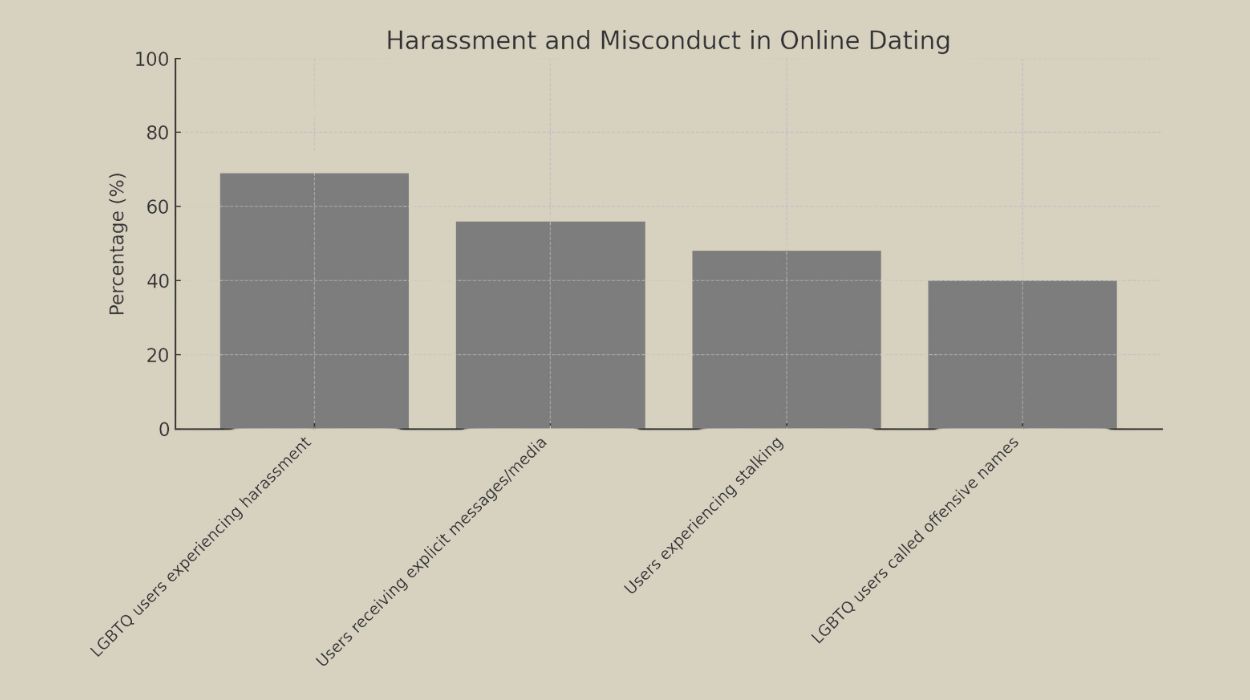
- 69% of LGBTQ online daters have experienced one or the other form of harassment online.
- 56% of online daters from this category reported receiving a sexually explicit message or media from someone they connect with online without asking for it. In contrast, this happened to 32% of straight people.
- 48% of online daters have felt harassed by someone trying to contact or stalk them even after explicitly conveying their lack of interest in the person.
- Four out of 10 LGBTQ daters have been called an offensive name or heard a demeaning slur on these platforms.
- Dating profile details or app location services have led to organized violence against and persecution of LGBTQ people. The location services that have been put in place to help people connect with like-minded individuals in their vicinity can prove to be a threat to these individuals. Anti-LGBTQ groups or people can use these location services to triangulate the tentative location of a user and can attack or harm them.
For Seniors
When it comes to people in their 50s and 60s getting back on the dating scene and embracing online dating, the risk of falling prey to romance scams remains the most pressing. Since these people are mostly financially secure and neither tech-savvy nor tech-safe, they make easy targets for scammers.
Scammers tap into the vulnerabilities of these unsuspecting people, filling the emotional void in their lives, gaining their trust, and then fleecing them of their life’s earnings on the pretext of an urgent, almost life-threatening financial crisis.
15 Online Dating Safety Tips To Protect Yourself
The risks of online dating match, if not outdo, its advantages. That’s why, it’s best to adopt some healthy skepticism and err on the side of caution to protect yourself, emotionally, physically, and financially. Some of the top online dating safety tips to bear in mind when dating online are:
1. Use a trustworthy platform

There are over 2,500 online dating platforms in the US alone. Not all of them adhere to the same standards of cybersecurity. That’s why the best bet at protecting yourself is to sign up on reputable and trustworthy sites such as Tinder, Bumble, OkCupid, Coffee Meets Bagel, and eHarmony. Most of these sites have paid premium memberships. So if you’re serious about finding a long-term match, consider getting one and connecting with people who have opted for similar membership programs. Once you get off the online dating wagon, delete your profiles.
2. Protect your private information
When you match with someone on a dating platform, the person will likely research you online run an internet search with your name. You’d do the same. If you’ve listed your office address on LinkedIn or have an open Instagram account with posts where your home location has been tagged, they can find out a lot about you with just the click of a button.
That’s why one of the most vital online dating tips we have for you is to commit to the highest levels of cyber hygiene like your life depends on it—because it might. Do not give out personal information on your dating profile and make your social media information private so that it’s not readily up for grabs online.
Related Reading: 9 Worrying Signs A Cyberstalker Likes You And How To Protect Yourself
3. Limit initial interactions to the app
Anyone who has been active on the online dating scene knows how common it is for people to fish for personal contact details soon after connecting with you. They may use excuses to get you to share your number or share theirs first to inspire confidence.
Whenever you’re tempted to give in, remember that your app has special security features to protect you from harassment, stalking, abuse, or myriad other risks. Your phone doesn’t. Anyone with the right tools and skills can gain access to a ton of private information stored on your phone or other devices once they have your contact details.
4. Consider getting a Google Voice number
If you want to communicate with your matches outside the dating app but don’t feel comfortable sharing your number with them just yet, consider getting a Google voice number. It can be set up by simply downloading an app, which generates a separate number that you can hand out to potential dates. The number will ring on your phone and you can use it to send and receive texts. If things go haywire and you want to cut the person out of your life, blocking them and moving on becomes a whole lot easier.
5. Don’t sync your dating profile with your social handles

Linking your dating profile with your social handles may seem like a convenient way to give potential matches a sneak peek into your life. But you could also be giving potential creeps the same kind of access. So, steer clear of that temptation. Be mindful about the pictures you post on your dating profile and preferably don’t use pictures from your social media handles, even if you’re posting them separately. It takes one image search on Google for those images to throw up links of your social media handles, and give a potential stalker or fraudster access to your private life.
6. Research your matches
This is one of the most basic yet effective online dating safety tips—before you become invested in a potential match enough to want to take things forward with them IRL, spend some time researching them online. Run an internet search with their name and photo to see what results you get. Perhaps, they too have taken the convenient route and linked their social media handles to their dating profiles. A quick scroll can give you a sense of potential red flags about the person.
On the other hand, if you don’t find any information about them either by name or image search, consider that a red flag in itself. In today’s digitally inter-linked world, it’s near impossible to not have some kind of a presence on the internet. If your search for a match throws up a blank, it might well be a fake profile.
Related Reading: To Swipe Left Or Right? Smart Insights for Better Matches
7. Keep an eye out for romance scams
Dating platforms, particularly those that let you sign up for free, have become a gold mine for scammers looking to steal money from or identities of unsuspecting users. So, keep an eye out for romance scammer red flags. Typically, these are people who claim to be working in a far-off destination—military personnel deployed in Afghanistan, someone working on an oil rig, or a businessperson on assignment in another continent.
They say and do all the right things to win your trust and make you fall for them. They’re quick to profess their love to you as well. A romance scammer will always rush you to share your contact details with them so that they can pursue you without worrying about the dating platform’s security features. While they’re always available to chat or text, they shy away from voice and video calls.
The relationship will progress way too quickly and feel too good to be true. When they feel like they have earned your trust, they will ask you for money citing a pressing financial crisis. Not ignoring the red flags and asking the right questions can help you outsmart a scammer. If you spot these signs, you must report the incident to the complaint assistant of the Federal Trade Commission as well as the Internet Crime Complaint Center of the FBI and the state Attorney General.
8. If something feels off, get out
Giving someone the benefit of the doubt may not be in the interest of safety when you’re dating online. If a potential match makes you uncomfortable, take a step back and stop talking to them. Likewise, if someone continues to pursue or harass you after being told off, don’t hesitate to block them and report their profile.
9. Have a video chat before meeting in person
If a match passes through all these levels of checks and you feel a connection with them, it’s only natural that you may want to take things forward in the real world. But before you get down to planning your first date, have a virtual date with them over a video call. This will help you ascertain the identity of the person. You can then proceed to know for sure that you’re not being scammed, catfished, or walking into a trap set up by a predator.
10. Meet at a public place

It’s online dating safety 101 to not invite someone to your place or go to theirs for the first date. At the same time, it’s equally vital that you choose a public place for your meeting. A park, bar, restaurant, café are all good choices. Don’t go to a hotel room or to the woods for a hike with them. In short, steer clear of any setting where you two will be alone, and you can’t reach for help if the need arises.
11. Set a limit on the time you spend together
Always put a time limit on how long you’re going to hang out with someone on a first date after meeting online. Tell a family member or friend to check in on you within half an hour of that time. Even if you’re having a good time, stick to your plan. There will be other opportunities for you to spend time together in the future.
12. Drive or take public transport
The idea of your date coming to pick you up may seem cute and romantic, but remember that by letting them do so, you’re telling them where you live or work. Besides, you will end up alone in the car with them, which creates the perfect opportunity for someone to prey on you if their intent is not right.
So, it’s advisable to get to and back from your date on your own. Drive yourself, get a cab or public transport. And return home the way you got there. Do not agree to let them drive you or walk you home for the same reasons you shouldn’t let them pick you up.
Related Reading: The Best Online Dating Advice for Men & Women
13. Keep someone in the loop
Once the details of your first date are set, share them with a friend, confidant, or family member. Tell them where you’re going, with whom, at what time, and how long you intend on staying. Share the name and contact details of your date with them as well. It will be easy for your loved ones to come to your aid should the need for it arise if they know the details of your plan.
14. Remember you’re not obligated to share personal details
You may like this person enough to want to get to know them better and vice versa, but that doesn’t make you obligated to answer all their questions. Stick to comfortable first-date conversation topics and if they ask you something that feels too personal or intimate by all means tell them that you don’t want to talk about it. This can be anything from your personal information to details about your past.
15. Go easy on the booze
Yes, a drink or two can help calm the nerves and cut some of that awkwardness but getting drunk on a date is not a good idea. Be mindful of how much alcohol you can handle and draw a line. This becomes even more crucial if your date seems to be pushing you to down a few shots or have an extra drink or 5 in the name of having a good time. When you’re not in control of your senses, it’s hard to stay in control of the situation.
Final Thoughts
Online dating has become a cultural standard. No matter what your age or relationship history, if you’re looking to meet someone new, chances are you will have to sign up on a dating platform. With so many potential risks and threats lurking around, prioritizing your safety above everything else is the only way to protect yourself. The simple rule of thumb is—if it makes you uncomfortable, walk away.
Your contribution does not constitute a charitable donation. It will allow Bonobology to continue bringing you new and up-to-date information in our pursuit of helping anyone in the world to learn how to do anything.

